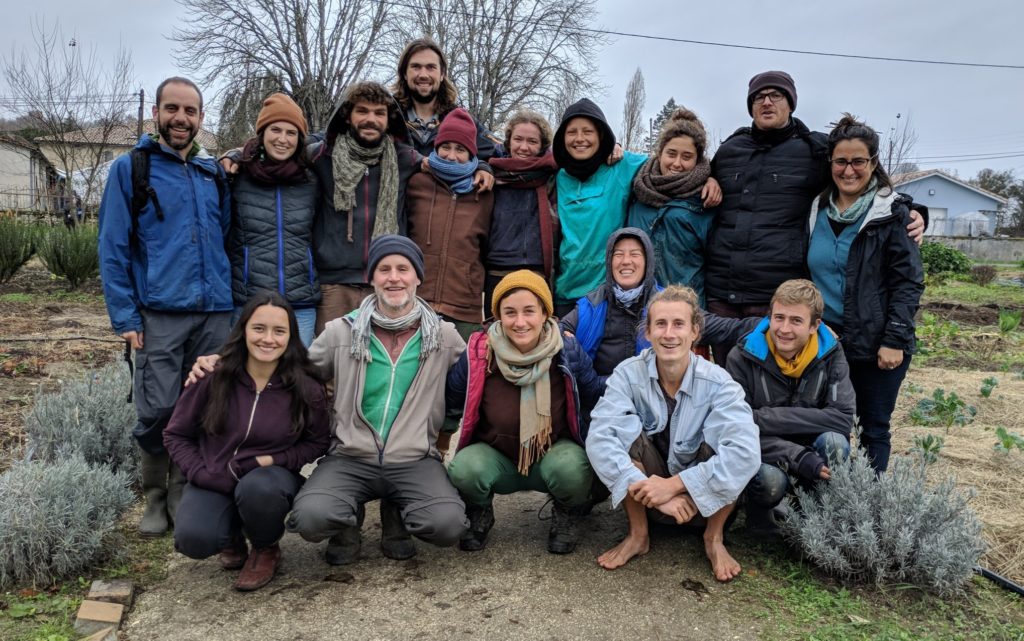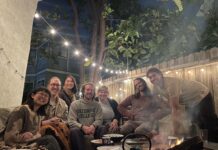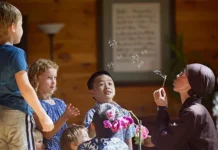December 6, 2018 in New Hamlet

Q: Why did you stay for three years in Plum Village? Did you know in the beginning you’d stay that long?
Mick: No, I didn’t know in the beginning [I’d stay that long in Plum Village.] I have just entered my fourth year—three years and two months. My original plan was to come for one year. I discovered Thay and the practice of Plum Village years ago when I was traveling for a year; I took a year out, like many younger people, and travelled around the world. In 2007, I was in New Zealand and was recommended to visit a community called Dharma Gaia, a small beautiful Plum Village practice centre, in the native forest. I became interested, but I didn’t do much with the practice after my stay ended.
Ironically, I spent one month in Hue, Vietnam, during the same year, but I had not heard of Thay, Plum Village or the practice. I probably smoked lots of cigarettes and drank lots of cheap Asian whiskey.
Then Thay came with the Sangha to Republic of Ireland in 2012. A friend had a little Sangha in Belfast where I lived. She encouraged Sangha members to come to a big retreat for 800 people with Thay. After that, Thay spent a few more weeks with the Irish Sangha. He came to Northern Ireland, where I was born, and went to our government buildings to speak with our politicians. We had recently ended our protracted history of conflict and violence, from which many thousands of people had died. Thay emphasised reconciliation and peace in oneself—peace in the world. Some of those politicians had been involved in the violence, so it was a powerful day. After that retreat, people—whom I now regard as my some of my best friends—set up another Sangha in Belfast called “The Leaves of One Tree.”
This Sangha continues meeting weekly. They support each other in practical ways if needed by helping each other move house from one place to another, for example. One friend is sick at the moment, so our group went to the hospital and held a Sangha session to practice together around his bed. The Sangha has made a big impact on my life. We’re a small country, so we get to know each other quickly and often get together with other Irish Sanghas to practice.
During the big retreat with Thay, I met some of the brothers, and I remember Brother Bao Tang (Brother Treasure) from Indonesia. Talking with them definitely planted the seed of monastic aspiration in me. Those seeds had probably been there since I was a child. I was interested in a pastoral life, perhaps as a Christian minister or a priest. I had dropped that idea, however. I was sixteen or seventeen, and it wasn’t cool. At that retreat, something came alive in me.
My idea was to come, experiment and experience the reality of day-to-day life in Plum Village—to see if the monastic life was for me.
My life changed during the three to four years before I moved to Plum Village. I was lucky if I could then take even one or two weeks away from work to come on retreat before I moved at the end of 2015.
My idea was to come, experiment and experience the reality of day-to-day life in Plum Village—to see if the monastic life was for me. I was fortunate that the Happy Farm Project had already been going for two or three years at that stage. Friends had initiated the project, and I was able to join the team. This meant that I was able to be of service doing something that interested me. Back home I had worked in ecology, growing foods and horticulture. Moreover, my work had an education element since it involved children, teenagers and communities. The practice was the container for all activities on the farm.
After one year at Plum Village, I still had doubts. I felt the monastic aspiration come up strongly at certain times, such as during the ordination ceremonies. Nevertheless, when I’d been there a year and a half and was settled in, I realised I was not ready. I wanted to go back to the wider society, outside the walls of the monastery before I looked seriously at monastic life. Some hesitations were about silly things; others were more serious. One question I struggled with was, “Can I live with other monastics in the same room all my life and not have my own bedroom?” This is such a deep practice. We all enjoy it at times, but that was a real block.
The reason why I put my spiritual roots down in the Plum Village tradition was because of the idea of engaged Buddhism.
In the middle of this internal debate, Stuart, my friend from Scotland who started the Happy Farm, left. The community was looking for somebody to stand in and continue his work. These causes and conditions meant that I could take on the project and continue this work with my friends, sisters and brothers.
Now it’s time to carry on that practice of serving others back home.
Q: How did you know that it was time to leave Plum Village?
M: That’s a good question. My decision was based on practical things. For instance, how was I going to support myself financially for practical things while being in Plum Village for three and a half years? At Plum Village, there’s always food on the table, a bed to sleep in and all the spiritual food we receive. I could have stayed longer and served in Upper Hamlet. I could have had those practical needs met, but I think there came a time when I needed to look at my deeper aspirations. I needed to figure out questions such as: if my life is not as a monastic, then is it my life as a lay person living in the monastery? I acknowledge that living here has been an honour, and I’ve gained so much.
As I looked deeply, I felt a deep calling to return to Northern Ireland. I think we all have that, wherever we come from, where we have the recent legacy of conflict. The reason why I put my spiritual roots down in the Plum Village tradition was because of the idea of engaged Buddhism. Thay’s message (and the foundation of the Order of Interbeing and School of Youth for Social Service) is not to just sit on the cushion or to practice inside the monastery but to become active in your community.
One question I struggled with was, “Can I live with other monastics in the same room all my life and not have my own bedroom?
In Ireland, we have peace at the moment, but it’s described as a fragile peace. The inequality of wealth that leads to the inequality of wellbeing is prominent in the Irish society.
I have always been interested in the wider picture of caring for Mother Earth. Now, this generation has to act on climate change, our climate and ecological crisis. Yes, we contribute practically with the Happy Farm as a beautiful model of regenerative farming and ecological agriculture. However, I feel the need to continue this work outside the monastery. On my own? Definitely not but to take refuge and to enjoy the camaraderie and friendship of my Sangha sisters and brothers in Ireland. I feel this strong spiritual connection to my Plum Village brothers and sisters, lay and monastic, supporting me.
My journey has a spiritual and personal dimension as well. It’s been rich to live a lay life, a celibate life for nearly three and a half years. However, there’s something deep in my soul that is calling me to go back and engage in—or at least explore—which is a long-term romantic relationship. I didn’t necessarily want to put energy into that kind of relationship while I was here as a lay friend in Upper Hamlet. We are allowed to create these relationships in a respectful way here. Most of us have experienced difficulties and suffering in past romantic relationships. I’ve caused difficulties and suffering. I wasn’t aware of Thay’s teachings, or even the Buddha’s, on true love. One sentence that would have helped me earlier is, ‘In true love, there is no place for pride.’ In previous relationships, I was quite stubborn, and I didn’t have the skills to genuinely love someone and understand my partner.
One sentence that would have helped me earlier is, ‘In true love, there is no place for pride.’
Thay says, “Love is understanding.” I felt I was loving, but maybe lots of time I didn’t understand my partner. As I get older, I want to go out and see if a long-term romance is the path for me. Yes, there’s some pressure to make that happen, but I try not to put too many expectations on myself.
It’s time to go for personal reasons and to be closer to my blood family, and to honour those relationships. It’s been hard sometimes to be in France, since most of them are in Ireland (although some have come to visit me.)
When I came first to Plum Village, I thought, “Wow, I’m lucky I don’t have this heaviness that sometimes people have when they come to Plum Village—their difficulties and mental health issues.” But after some years, things have come up that I must’ve been pushing way down, such as lack of self-esteem, confidence in who I am, and body confidence. These issues may have blocked romantic relationships in the past. Additionally, I may have been telling myself the story that the culture I come from—it’s not the culture that I belong tor says I need to live elsewhere. Yet, I wanted to contribute to community, to put down roots and to belong.
These threads of a story came together and told me, “Okay, I could stay in Plum Village and benefit.” I am grateful there is a beautiful option to serve and to benefit personally, but I wanted to return home. Next year [in 2019], I’ll be able to return for nearly ten weeks; I can do a retreat for myself and take refuge. Moreover, I’ll be able to continue to contribute in whatever way I can.
We contribute practically with the Happy Farm as a beautiful model of regenerative farming and ecological agriculture.
Interview conducted by Annica and transcribed by Martina McNaboe

















That a boy Mick